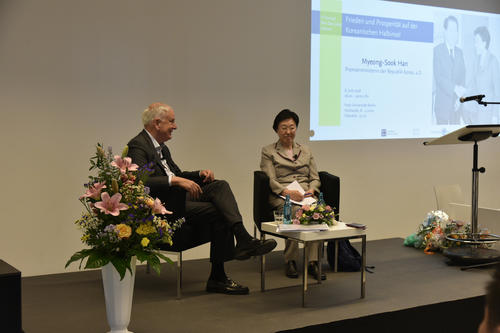Han Myeong-Sook
At the first Kim Dae Jung Lecture at Free University, former South Korean Prime Minister Han Myeong-Sook spoke about the peace process on the Korean peninsula.
Jul 13, 2018
The division of Korea affects Han Myeong-Sook personally. With the outbreak of the Korean War, she fled her hometown Pyongyang to go south. “I dream of one day being chosen for family reunification,” she said.
Image Credit: Jonas Huggins
The first Kim Dae Jung Lecture at the Institute for Korean Studies was held by former Prime Minister of South Korea, Han Myeong-Sook. Following her presentation, she conversed with a former German Ambassador to Seoul, Norbert Baas.
Image Credit: Jonas Huggins
The first Kim Dae Jung Lecture was held on June 8, 2018, by the former South Korean Prime Minister Han Myeong-Sook.
Four days before the scheduled meeting of U.S. President Donald Trump and North Korean leader Kim Jong-un on the island of Sentosa in southern Singapore, the former Prime Minister of the Republic of Korea Han Myeong-Sook gave a lecture at Freie Universität Berlin on her country’s relations to North Korea.
The lecture on June 8 entitled "Frieden und Prosperität auf der koreanischen Halbinsel" was the first in the Kim Dae Jung Lecture series, which will take place annually at Freie Universität. The event was organized by the Institute of Korean Studies at Freie Universität in cooperation with the Kim Dae Jung Presidential Library & Museum of Yonsei University Seoul. Following her lecture, the former Prime Minister (term of office: April 2006 to March 2007) carried on a discussion with Dr. Norbert Baas, a former Ambassador of the Federal Republic of Germany in South Korea.
The lecture series will honor the life’s work of the former President of the Republic of Korea, Kim Dae Jung (1925-2009), who maintained a close relationship with Germany, Berlin, and Freie Universität. He often stressed the similar fate of Korea and Germany as divided countries. His ideas to overcome the Korean division were fundamentally based on the developments in Germany.
He presented his "three-step plan," the basis for the so-called "sunshine policy" that was implemented later, for the first time abroad in Berlin, in a small discussion group at the WZB Berlin Social Science Center (Wissenschaftszentrum Berlin), where members of Freie Universität were also participating. In March 2000 he chose Freie Universität as the location for his Berlin Declaration, which was broadcast directly to Korea. The declaration was an important step on the way to the first inter-Korean summit in June 2000. During the same year, Kim Dae Jung received the Nobel Peace Prize and the Medal of Honor from Freie Universität Berlin.
In his speech "Lessons learned from German reunification and issues of the Korean peninsula," he pointed out the close common ground between Korea and Germany, which South Koreans often regard as a special "shared destiny." He emphasized the important function of German politicians such as Willy Brandt and Richard von Weizsäcker, who during his difficult time in the opposition, "helped him with words and deeds, as if it were their own concern." Seven years later, in May 2007, in spite of major health problems, he returned to Freie Universität to accept the Freedom Award of Freie Universität. He was very interested in observing and promoting the university’s efforts to expand the field of Korean Studies.
Kim Dae Jung devoted his entire life to the democracy of his country and to a peaceful rapprochement between North and South Korea. For many decades he was subjected to political persecution: under the Korean military dictatorship Kim spent 16 years in prison, under house arrest, or in exile. Under pressure from the international community, a capital punishment imposed on him by the military regime in 1980 was averted.
As the most prominent dissident in South Korea, he organized the freedom movement while in exile in the United States. With the end of the dictatorship in 1987, he regained his political rights and founded the Party for Peace and Democracy, which later became part of the Democratic Party, which he also founded. In 1997 he was elected President of the Republic of Korea, an office he held from 1998 to 2003.


